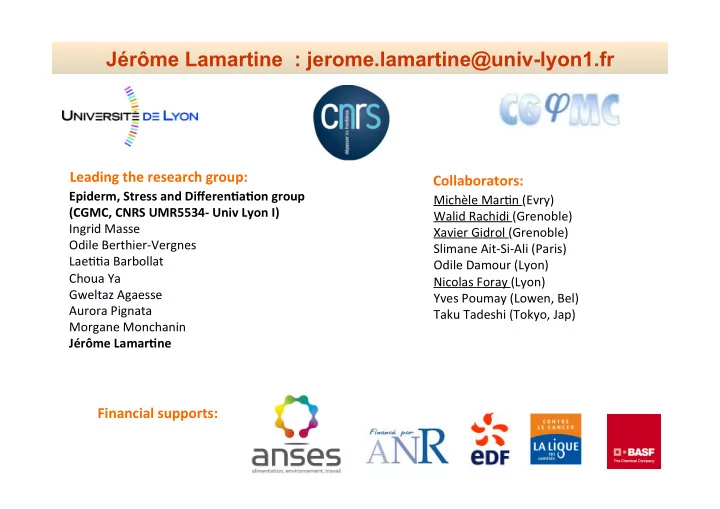

Jérôme Lamartine : jerome.lamartine@univ-lyon1.fr Leading ¡the ¡research ¡group: ¡ Collaborators: ¡ ¡ Epiderm, ¡Stress ¡and ¡Differen1a1on ¡group ¡ ¡ Michèle ¡Mar4n ¡(Evry) ¡ (CGMC, ¡CNRS ¡UMR5534-‑ ¡Univ ¡Lyon ¡I) ¡ Walid ¡Rachidi ¡(Grenoble) ¡ Ingrid ¡Masse ¡ Xavier ¡Gidrol ¡(Grenoble) ¡ Odile ¡Berthier-‑Vergnes ¡ Slimane ¡Ait-‑Si-‑Ali ¡(Paris) ¡ Lae44a ¡Barbollat ¡ Odile ¡Damour ¡(Lyon) ¡ Choua ¡Ya ¡ Nicolas ¡Foray ¡(Lyon) ¡ Gweltaz ¡Agaesse ¡ Yves ¡Poumay ¡(Lowen, ¡Bel) ¡ Aurora ¡Pignata ¡ Taku ¡Tadeshi ¡(Tokyo, ¡Jap) ¡ Morgane ¡Monchanin ¡ ¡ Jérôme ¡Lamar1ne ¡ Financial ¡supports: ¡
A research group part of the CGphiMC institute Center ¡for ¡Molecular ¡and ¡Cellular ¡Gene1cs ¡& ¡Physiology ¡(CGphiMC) ¡ 14 ¡research ¡groups, ¡more ¡than ¡120 ¡staff ¡scien1sts ¡and ¡students ¡ ¡Various ¡model ¡of ¡study ¡ : ¡human ¡cells ¡and ¡4ssues, ¡mouse, ¡drosophila, ¡nematode ¡… ¡
Understanding the effect of ionizing radiations (IR) in skin Epidermis: main target of radiocarcinogenesis Basal cell squamous cell carcinoma carcinoma angiosarcoma trichoepithelioma fibrosarcoma trichoblastic carcinoma
Epidermal cells (keratinocytes) strongly respond to low dose IR 2 ¡Gy ¡ 10 ¡mGy ¡ 369 ¡ 270 ¡ 213 ¡ Genes ¡responding ¡to ¡ionizing ¡radia4ons ¡(3h-‑72h) ¡ ¡FC ¡> ¡1.5 ¡pvalue ¡<0.05 ¡ Franco ¡et ¡al. ¡ Rad ¡Res ¡2005 ¡
Identifying biomarkers of radiation exposure easily detectable in human skin Non-‑invasive ¡cell ¡sampling ¡ Over-‑exposi4on ¡ (Tape ¡Stripping) ¡ detec4on ¡ Biomarker ¡ analysis ¡ Personalized follow-up of irradiated patients
Our model of study : 2D or 3D human epidermis 2D-‑culture ¡ 3D-‑culture ¡ Ca ¡ diff Reconstructed skin x25 Skin biopsies Primary human keratinocytes & fibroblasts Normal skin Hyper-radiosensitive patients
Normal vs reconstructed skin Normal ¡human ¡skin ¡ Reconstructed ¡skin ¡ Epidermis DEJ Dermis x25 x25 The ¡3-‑D ¡model ¡is ¡very ¡similar ¡to ¡the ¡normal ¡4ssue ¡
Engineering skin cells with specific gene modulation leading to radiation sensitivity from hypersensitive patients … …to genes of hypersensitivity Patched1, Gli1/2 Collabora4on ¡Michèle ¡Mar4n’s ¡lab ¡: ¡CEA, ¡FR ¡ Gorlin syndrome: deregulation hypersensitivity of the SHH pathway: and carcinoma Patched1 receptor susceptibility and Gli transcription factors
A model of reconstructed skin with radiosensitive cells: amplification of cellular response after low dose IR Normal ¡ ¡or ¡ Radiosensi4ve ¡kera4nocytes ¡ (PTCH ¡mt, ¡Sh ¡PTCH1, ¡GLI OE ) ¡ Normal ¡ ¡ ¡ ¡or ¡ Radiosensi4ve ¡fibroblasts ¡ (PTCH ¡mt, ¡Sh ¡PTCH1, ¡GLI OE ) ¡ x25
Extensive use of genomic approaches High-throughput DNA microarrays Next generation sequencing QPCR To ¡caracterize ¡the ¡transcriptome, ¡methylome, ¡miRnome ¡of ¡irradiated ¡skin ¡models ¡ Lamar-ne ¡et ¡al. ¡J ¡Cell ¡Biochem ¡2005 ¡ Franco ¡et ¡al. ¡2005 ¡Rad ¡Res ¡2005 ¡ Bagdoyan ¡et ¡al. ¡J ¡Biol ¡Chem ¡2005 ¡ Bonin ¡et ¡al. ¡BMC ¡Genomics ¡2009 ¡ Joly-‑Tonne- ¡et ¡al. ¡BMC ¡Genomics ¡2013 ¡
Specific interest in epigenetic effects of IR : microRNAs MicroRNA ¡induc4on ¡in ¡irradiated ¡skin ¡ MicroRNA ¡responding ¡to ¡10 ¡mGy ¡ Ctrl ¡probe ¡ MicroRNA ¡probe ¡ in ¡human ¡kera4nocytes ¡ ¡ 0 Gy 6 Gy 48h Joly-‑Tonne- ¡et ¡al. ¡BMC ¡Genomics ¡2013 ¡ ¡
Specific interest in epigenetic effects of IR: methylation marks LOWRADSENSOR projet : Low dose effects, markers and signature Transcriptome ¡ Methylome ¡ IR ¡10 ¡mGy ¡ Long ¡term-‑effects ¡ Cutaneous ¡cells ¡from ¡ radiosensi4ve ¡pa4ents ¡ Radiosensi4vity ¡ signature ¡ Control ¡Cells ¡ Func4onal ¡proper4es, ¡molecular ¡markers ¡
Looking ¡for ¡collabora4ons ¡…. ¡ (My ¡Ins-tu-on ¡is ¡not ¡a ¡member ¡of ¡ the ¡OPERRA ¡consor-um) ¡ Jerome.lamar1ne@univ-‑lyon1.fr ¡
Recommend
More recommend